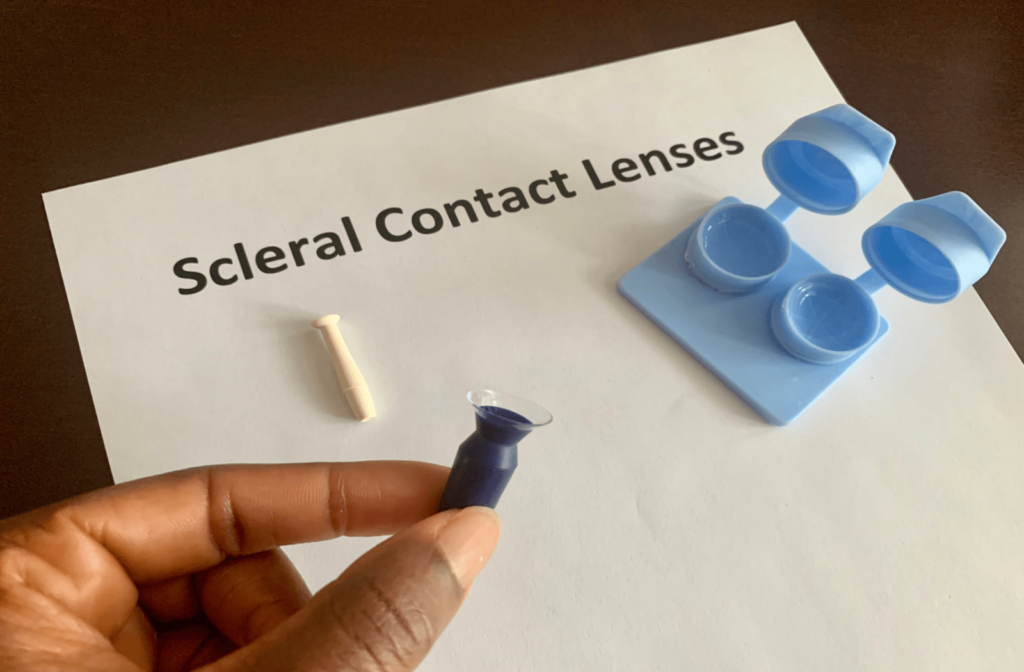Many people used to see contact lenses as unwearable if they had certain eye conditions, but today’s technology allows almost anyone to enjoy contacts. Scleral lenses can help you enjoy comfortable vision, but what are these contacts, and what do they do?
Continue reading to learn more about scleral lenses, including what they are, who benefits from them, and how they help.
What Are Scleral Lenses?
Scleral lenses are specialized contact lenses designed to cover your entire corneal surface. While traditional contact lenses rest on the cornea, scleral lenses rest on the sclera (the “white of your eye”). Conventional contact lenses aren’t for everyone, and scleral lenses allow people who would struggle with contacts to enjoy clearer vision without needing glasses.
The design of scleral lenses transforms an irregular cornea into a smooth optical surface. These lenses vault over the cornea, making them ideal for people with corneal conditions and other eye problems.
Who Can Benefit from Scleral Lenses?
Almost anyone can benefit from scleral lenses. Anyone looking to obtain clear and comfortable vision can get scleral lenses, but these lenses are particularly helpful if you have chronic dry eyes, keratoconus, or a previous eye injury.
Chronic Dry Eyes
Dry eyes can affect your quality of life in many ways. Besides irritation and discomfort, you may struggle to wear contact lenses. Traditional contacts can worsen dry eye symptoms, making them not worth the hassle.
Scleral lenses create a space between the eye’s surface and the back of the lens, known as a fluid reservoir. This fluid reservoir constantly washes over the eye, helping relieve dryness.
While scleral lenses won’t cure dry eye disease, they can make everyday life more comfortable and allow you to wear contact lenses without difficulty. A previous study on scleral contacts and dry eyes found these lenses are helpful for patients with severe dry eye symptoms.
Keratoconus
Keratoconus is a condition where the cornea begins to thin and change shape, bulging outward into a cone-like shape. Someone with cone-shaped corneas will have blurry and distorted vision and may have increased sensitivity to light and glare. Keratoconus can affect your ability to wear conventional contact lenses, but scleral lenses can help.
Because scleral lenses are larger than other lenses, they vault over the cornea and create a smooth optical surface. Vaulting over the cornea helps provide crisp and clear vision. Previous research found that scleral lenses offer safe and effective vision correction for patients with keratoconus.
Eye Trauma
Contact lenses may not feel comfortable to wear if you experience damage to your cornea or other parts of the eye. For some, contact lens use after an injury can be unsafe.
Scleral lenses can be more comfortable than traditional contact lenses if you have a previous eye injury. Your optometrist can determine whether or not these lenses are right for your vision needs.
The Benefits of Scleral Lenses
Scleral lenses are large-diameter rigid gas permeable lenses. They are larger than traditional lenses and firmer than soft contact lenses. They have similar benefits to other gas permeable lenses, including:
- Easier handling
- Greater durability
- Less risk of complications
- Sharper vision
However, scleral lenses are sturdier than conventional rigid gas permeable lenses—their larger size means they are less likely to dislodge from the eye. The size of the lenses can make them more comfortable to wear.
These lenses are highly breathable, allowing oxygen to pass through to the eye’s surface to keep it healthy. Another benefit of scleral lenses is that they can be customized, depending on your eye care provider.
Customized Scleral Lenses
Custom scleral lenses can provide a snug and comfortable fit. This process involves using a scleral topographer to analyze your eye’s surface. Your eye doctor will determine the best fitting lens based on your eye scan. They’ll then assess the overall fit and make changes to ensure your lenses are comfortable.
Caring for Scleral Lenses
Scleral contact lenses require the same care as traditional lenses. Always listen to the detailed care instructions provided by your eye doctor, but consider the following tips as a guideline:
- Avoid wearing contacts if you swim
- Replace your contact lenses & cases on the schedule recommended by your eye doctor
- Use only recommended, sterile contact lens solution
- Wash your hands with soap & water before handling your contacts
Are Scleral Lenses Right for You?
Scleral lenses have many benefits, especially if you have chronic dry eyes, keratoconus, or a previous eye injury. Even if you have no prior issues, these lenses can offer clear and comfortable vision. If you’re wondering if scleral lenses are right for you, the best thing you can do is speak with your optometrist.
We’re known as the Scleral Lens Institute of Cincinnati, and we can discuss how scleral lenses can benefit your vision. Come with any questions or concerns you may have, and we can do our best to address everything you wish to discuss.
Contact us if you’re interested in scleral lenses.



